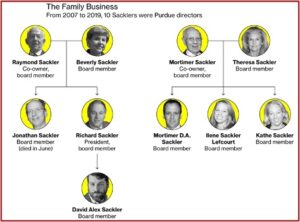
While news on the fighting in Ukraine was dominating the headlines at the beginning of March in 2022, a struggle of a different kind came closer to an end. The legal battle between the Sackler family and Purdue Pharma on the one side, and a group of states who refused to sign off on the settlement last summer seems to have ended when both sides agreed to a mediated settlement. The New York Times reported it was the first time in three years of negotiations that all states accepted a settlement agreement with Purdue Pharma and the Sacklers. “While the deal is a breakthrough, it is likely to leave many people disappointed that members of the Sackler family did not acknowledge wrongdoing or any personal responsibility for the public health crisis.”
If the judge presiding over Purdue’s bankruptcy proceedings approves the agreement, the Sackler family would pay up to $6 billion to help communities provide assistance for the damage from the ongoing opioid crisis. This was an increase of more than $1 billion from an earlier offer. The Sacklers would have 18 years to make payments of the additional $1 billion. In return, Sackler family members would be protected from all current and future civil claims against them over their company’s prescription opioid business. However, the deal does not protect them from potential criminal cases, which are difficult to prove.
The Sacklers’ position on prohibiting future civil lawsuits was a major obstacle for states that opposed the plan. The latest deal included an agreement by the Sacklers to create a public repository of confidential documents that detail lobbying, public relations and marketing activities with OxyContin. The attorney general of Connecticut, one of the states that rejected the earlier offer, said the settlement was both significant and insufficient, “constrained by the inadequacies of our bankruptcy code.” This settlement resolves their claims against Purdue and the Sacklers, but the fight continues against the wider addiction industry.
The new mediated agreement has several additional terms. Family members from the Sackler family were to attend a hearing that would allow people who suffered from OxyContin addiction to describe what they endured. Any medical centers, art or educational institutions that bear the Sackler name can remove it without their action being contested by the family. Also, there was a statement attached to the settlement that was characterized as an “apology.” Widely described as an apology, this statement doesn’t seem to qualify as one. The Sackler family said:
The Sackler families are pleased to have reached a settlement with additional states that will allow very substantial additional resources to reach people and communities in need. The families have consistently affirmed that settlement is by far the best way to help solve a serious and complex public health crisis. While the families have acted lawfully in all respects, they sincerely regret that OxyContin, a prescription medicine that continues to help people suffering from chronic pain, unexpectedly became part of an opioid crisis that has brought grief and loss to far too many families and communities.
The new settlement still faces a difficulty. The U.S. Trustee program, which oversees the bankruptcy system within the Department of Justice, has argued vigorously against the proposed immunity shield for the Sacklers. Before the tentative agreement, there was a conflict building in the U.S. Court of Appeals for the Second Circuit. So far, the Justice Department has not commented on whether it would continue to challenge that condition of the tentative settlement.
The above-noted hearing was conducted on March 10th by the judge overseeing Purdue’s bankruptcy and featured 26 people from 19 states. The NYT said it was the first time individuals were able to directly address members of the Sackler family. The three members of the Sackler family who attended the hearing were: Dr. Richard Sackler, a former president and chairman of the board; David Sackler, a former board member; and Dame Theresa Sackler, a former board member and widow of Dr. Mortimer Sackler, one of the company’s founders.
Dame Theresa sat quietly; her expression unchanging. David Sackler sometimes shifted his position. Dr. Richard Sackler, who was the family member seen as most involved in the company’s aggressive marketing of OxyContin, remained off camera the whole session. This infuriated some of the participants. One of the individuals referred to the Sacklers as “killers,” saying that to this day, they deny any wrongdoing; that the family acted lawfully in all respects. “Richard, can you honestly say that with a straight face? If so, why don’t you turn on your camera and let’s see?”
Dr. Sackler was permitted to remain off camera by prior agreement. Also by prior arrangement, the Sacklers did not speak during the session and did not issue a statement afterwards. An individual testifying at the hearing, who was himself in recovery from an opioid addiction, quoted a statement made by Dr. Sackler in 2001, which said: “We have to hammer on the abusers in every way possible. They are the culprits and the problem. They are reckless criminals.” He then accused Richard Sackler, “You are the abuser. You are the criminal and you are the culprit . . . I hope that every single victim’s face haunts your every waking moment.”
A man from Indiana, who was a criminal court judge, lost his son to an overdose. The man and his wife began their testimony time by playing a recording of the 911 call made when they found their son dead from an overdose. He was “a straight-A student in college, studying law.” The judge said to Dr. Sackler, “I have put away drug dealers with a single rap of a gavel without blinking an eye. Oh, how I wish I could do the same to you, Richard Sackler.”
Foundations, art galleries and museums around the world have requested they become distanced from the Sackler name, including: The Metropolitan Museum of Art and the Dia Art Foundation in New York, the Serpentine Gallery and the four Tate galleries in the U.K., and the Louvre in Paris. Others, including the Guggenheim and the American Museum of Natural History in New York, and the British Museum in London have not announced plans to remove the Sackler name from their institutions.
Members of the Sackler family have persistently denied that the billions of dollars removed from Purdue Pharma over the course of a decade was done to shield assets from potential litigation over their role in the opioid crisis. But a review of emails, memos and other documents showed that Sackler family members discussed exposure to potential litigation as early as 2007, “a full decade before they faced a new wide-ranging legal attack and significant financial transfers stopped.”
Blomberg Businessweek published an article noting “How the Sacklers Shifted $10.8 Billion of Their Opioid Fortune.” Initially, Purdue and its subsidiaries moved billions to companies registered in Luxembourg, the British Virgin Islands and Delaware. “From 2008 through 2017, $10.8 billion flowed out of Purdue in hundreds of transactions through numerous subsidiaries.” The money eventually landed in two Delaware companies, Rosebay Medical Co. and Beason Co., which are trusts for the benefit of the Sackler family. See the Bloomberg article for particulars of the monetary shell game with Purdue funds.
Blomberg said a spokesperson for the family said in a statement: “All of the Sackler family members, including those who served on Purdue’s board, have always conducted themselves properly.” From 2007 to 2019, 10 Sacklers were Purdue directors. The following graphic appeared in the Blomberg article.
NPR reported last year that “Purdue Pharma conducted Massive Probe of the Sacklers, But The Findings Are Secret.” The company acknowledged hiring attorneys, forensic accountants and other financial experts to probe members of the Sackler family. The team searched for evidence of wrongdoing by the family and reported their findings to a special committee of Purdue’s board between April 2019 and March of 2021. But Purdue chose to reveal essentially nothing of what investigators uncovered. “Purdue’s disclosure filing says it paid its lawyers for a 22,000-hour investigation of the Sacklers, but it doesn’t disclose any of their findings.”
Writing for NPR, Brain Mann said the Purdue Pharma document suggests the primary goal of the investigation “was to inform and shape bankruptcy talks” that were underway at the time. Speaking on behalf of the Sacklers, spokespersons downplayed the significance of the investigation and maintained members of the family did nothing wrong. An attorney for the Raymond Sackler family said: “As we have said before, we support the release of documents and they will continue to show Sackler family members who served on Purdue’s board acted ethically and legally.”
A few clues about what investigators found were evident in the filing. The filing stated that “certain dealings between Purdue Pharma and the Sackler families and various Sackler entities were not conducted on arm’s-length terms.” There is a link to the “Alix Report on Distributions to Sacklers,” noting compensation, pension benefits, travel and expense reimbursements, legal expenses incurred on behalf of Sackler family members, and fringe benefits provided to members of the Sackler family such as cell phones, fleet vehicles and personal service employees up until April 30, 2019.
It seems the Sacklers were playing the long game from the time of Purdue’s first admission of illegal actions in “misbranding” OxyContin in 2007. See “Giving an Opioid Devil Its Due.” From 2008 until 2017 there was a transfer of over $10 billion out of the company. From 2007 to 2019, 10 different members of the Sackler family served on Purdue board. An extensive investigation by Purdue was done of members of the Sackler family looking for evidence of wrongdoing.
The investigative team reported to a special committee of the board between April of 2019 and March of 2021, but failed to publicly disclose any of its findings. The Sacklers consistently denied any wrong doing and repeatedly warned that a failure to protect family members from all current and future civil claims against them over their company’s prescription opioid business would scuttle the bankruptcy negotiations and perhaps end “The ability of creditors, communities, and individuals to receive billions in value to abate the opioid crisis,” according to Steve Miller, Purdue’s chairman.
The Sacklers will not face any civil charges; criminal filings are very difficult to prove and will likely not be filed. Despite the transfer of billions of dollars from Purdue, ultimately to family trusts, members of the family deny having done anything ethically or legally wrong. Their so-called apology was formed in non-apologetic rhetoric that took no responsibility for Purdue Pharma’s or the family’s role in birthing the opioid crisis. There is no apparent remorse by members of the Sackler family involved in the day-to-day operations and decisions of Purdue Pharma that led to the eventual addiction and deaths of hundreds, if not thousands of people. There seems to have been one unverbalized, but clearly communicated statement by the Sacklers in their so-called apology quoted above: “It’s not personal; it’s strictly business.”
For further information on the Sacklers and Purdue Pharma, see: “It Doesn’t Seem Right,” “Carrot-and-Stick Tactics of Purdue and the Sacklers” and “What Purdue and the Sackler Family Treasure.”






